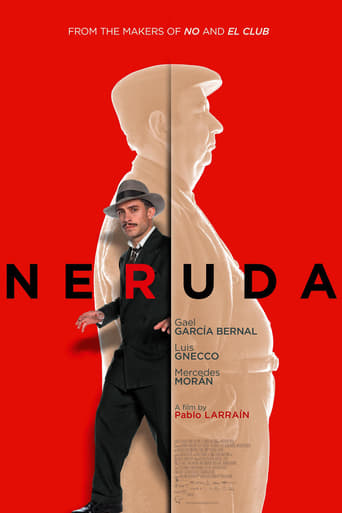Kirpianuscus
about art , politic, joy of life, Neruda and his universe, a hunt remembering the obsession of Javert, music of freedom and the Communism in Chilian version. a short sketch of Pinochet. admirable performances - especially Luis Gnecco - and a surprising Gael Garcia Bernal who knows use in the best manner the pieces of sketch defining his character. it is a poem not because it reflects, in subtle, seductive , eccentric, courageous manner a slice from Neruda life but because the significant result after the final credits is a special state. it could be emotion or impact with the new perspective about well known things, the state after a splendid show or the work with the pieces of a large puzzle. because the film is not exactly a biographic one. but a reflection about great, large universal themes in seductive manner.
Knox Morris
You have your conventional biopics, movies like The Theory of Everything and The Imitation Game, which have a self-inflated poignance that makes dumb, popcorn-shoving moviegoers feel like intellectuals. On the other hand, you have your other kind of biopics, like Patton and Mishima: A Life In Four Chapters, that not only tell the story of the man but also analyze his motives, psyche, and humanistic qualities. Neruda is the most recent in this prestigious canon of unconventional biographies; a well versed exercise in classic filmmaking with a modern spin. It succeeds at being auteuristic, old-fashioned, and naturalistically moving. The lead characters (expertly brought back to life by Bernal and Gnecco), connect to each other in ghostly, figurative telekinesis, as if the spirit of the human soul binds them metaphysically. Pablo Larrain, the film's director, treats the plot with superior surveillance, making sure each detail is at its maximum clarity. The script, which unavoidably brings to mind Costa-Gavras's earliest work, breaks many of the genre's clichés without losing sight of its poetically haunting story. And, lastly, I must call kudos to the film's composer, who has written a soundtrack in the tradition of Bernard Herrmann and Jerry Goldsmith. See this film. Experience it.
Argemaluco
My knowledge about author Pablo Neruda was limited to a book of poems I read as a teenager. So, due to my little experience with his work, the film Neruda was a revelation from the beginning to the end, illustrating me about the "secret life" of the famous writer and his life as a political dissident. Despite that unexpected premise, screenwriter Guillermo Calderón conciliates Senator Neruda with artist Neruda, making the film begin as a political thriller which gradually becomes a dreamlike poem in order to satisfactorily conclude on a simultaneously magical and realistic ending. Calderón's best trick is changing the main character without fracturing the narrative; the first half is focused on the ideological evolution from Neruda, one of the few Senators who were against the influence the United States was making over the President of Chile; then, his political downfall comes, and the narrative focus switches to Óscar Peluchonneau, a relentless policeman who chases him, displaying his turbulent psychology and "daddy issues" which motivated his mission, as well as the strange connection he develops with his prey. That's a precarious balance which is very well handled by Calderón and director Pablo Larraín, supported by the excellent performances from Luis Gnecco and Gael García Bernal as Neruda and Peluchonneau (respectively). The quantity and variety of themes examined in Neruda defy the simple structure of any biopic; however, the result was satisfactorily complex and ambitious, without losing the didactic qualities of a good History lesson (whose fidelity regarding the true events I'm not interested in finding out). In conclusion, Neruda is a brilliant film, and a fascinating look into the hidden side of a man whose legacy transcends the poetry for which he's remembered. I just wish all the biopics to be as creative and intelligent as this one (yes, starting by the recent Jackie, also directed by Larraín).
dickmckinlay
I agree with "jakob13" in his review of this fascinating movie. But I believe that it warrants more historical perspective, only hinted at in the movie. The influence of the US in enforcing its post-war anti- communist zeal throughout the Americas is mentioned, but not reinforced. The rise of Pinochet (also referenced in passing) is barely revealed. On balance, though, I'm not sure how much this matters, since the thrust of the movie is not historical recreation, but rather, the revelation of those aspects of character and consciousness that guide poet and public, hunter and hunted in extraordinarily threatening times.




